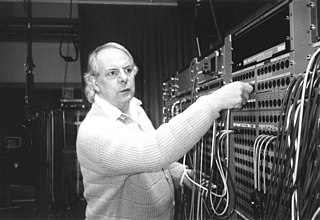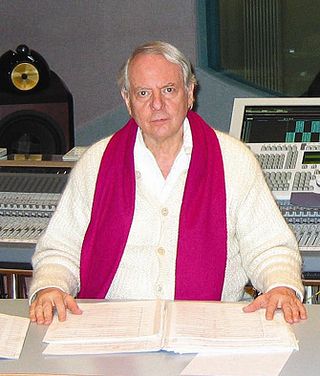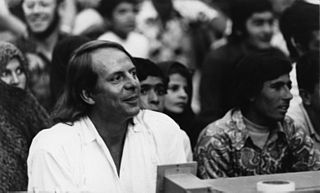Related Research Articles

Karlheinz Stockhausen was a German composer, widely acknowledged by critics as one of the most important but also controversial composers of the 20th and early 21st centuries. He is known for his groundbreaking work in electronic music, having been called the "father of electronic music", for introducing controlled chance into serial composition, and for musical spatialization.
Process music is music that arises from a process. It may make that process audible to the listener, or the process may be concealed.

Licht (Light), subtitled "Die sieben Tage der Woche", is a cycle of seven operas composed by Karlheinz Stockhausen between 1977 and 2003. The composer described the work as an "eternal spiral" because "there is neither end nor beginning to the week." Licht consists of 29 hours of music.
David C. Johnson was an American composer, flautist, and performer of live electronic music.

Darmstadt School refers to a group of composers who were associated with the Darmstadt International Summer Courses for New Music from the early 1950s to the early 1960s in Darmstadt, Germany, and who shared some aesthetic attitudes. Initially, this included only Pierre Boulez, Bruno Maderna, Luigi Nono, and Karlheinz Stockhausen, but others came to be added, in various ways. The term does not refer to an educational institution.

Aus den sieben Tagen is a collection of 15 text compositions by Karlheinz Stockhausen, composed in May 1968, in reaction to a personal crisis, and characterized as "Intuitive music"—music produced primarily from the intuition rather than the intellect of the performer(s). It is Work Number 26 in the composer's catalog of works.
Gruppen for three orchestras (1955–57) is amongst the best-known compositions of German composer Karlheinz Stockhausen, and is Work Number 6 in the composer's catalog of works. Gruppen is "a landmark in 20th-century music ... probably the first work of the post-war generation of composers in which technique and imagination combine on the highest level to produce an undisputable masterpiece".
Boudewijn Buckinx is a Belgian composer and writer on music.

Hymnen is an electronic and concrete work, with optional live performers, by Karlheinz Stockhausen, composed in 1966–67, and elaborated in 1969. In the composer's catalog of works, it is No. 22.
John McGuire is an American composer, pianist, organist, and music editor.
Michael Vetter was a German composer, novelist, poet, performer, calligrapher, artist, and teacher.

Spiral, for a soloist with a shortwave receiver, is a composition by Karlheinz Stockhausen, written in 1968. It is Number 27 in the catalogue of the composer's works.

Zeitmaße is a chamber-music work for five woodwinds composed in 1955–1956 by German composer Karlheinz Stockhausen; it is Number 5 in the composer's catalog. It is the first of three wind quintets written by Stockhausen, followed by Adieu für Wolfgang Sebastian Meyer (1966) and the Rotary Wind Quintet (1997), but is scored with cor anglais instead of the usual French horn of the standard quintet. Its title refers to the different ways that musical time is treated in the composition.

Fresco is an orchestral composition written in 1969 by the German composer Karlheinz Stockhausen as foyer music for an evening-long retrospective programme of his music presented simultaneously in three auditoriums of the Beethovenhalle in Bonn. It is Nr. 29 in his catalogue of works, and a performance takes about five hours.
Prozession (Procession), for tamtam, viola, electronium, piano, microphones, filters, and potentiometers, is a composition by Karlheinz Stockhausen, written in 1967. It is Number 23 in the catalogue of the composer's works.

Pole (Poles), for two performers with shortwave radio receivers and a sound projectionist, is a composition by Karlheinz Stockhausen, written in 1970. It is Number 30 in the catalogue of the composer's works.
Thomas H. Wells is an American composer, pianist, organist, and arts-organization administrator.

Für kommende Zeiten is a collection of seventeen text compositions by Karlheinz Stockhausen, composed between August 1968 and July 1970. It is a successor to the similar collection titled Aus den sieben Tagen, written in 1968. These compositions are characterized as "Intuitive music"—music produced primarily from the intuition rather than the intellect of the performer(s). It is work number 33 in Stockhausen's catalog of works, and the collection is dedicated to the composer's son Markus.

Ensemble is a group-composition project devised by Karlheinz Stockhausen for the 1967 Darmstädter Ferienkurse. Twelve composers and twelve instrumentalists participated, and the resulting performance lasted four hours. It is not assigned a work number in Stockhausen's catalogue of works.

Musik für ein Haus is a group-composition project devised by Karlheinz Stockhausen for the 1968 Darmstädter Ferienkurse. Fourteen composers and twelve instrumentalists participated, with the resulting performance lasting four hours. It was not regarded by Stockhausen as a composition belonging solely to himself, and therefore was not assigned a number in his catalog of works.
References
- ↑ Stockhausen 1989, pp. 113–114.
- ↑ Stockhausen 1993.
- ↑ Bergstrøm-Nielsen 1997.
- ↑ Iddon 2004, pp. 91, 99.
- ↑ Misch and Bandur 2001, p. 478.
- ↑ Stockhausen 2009, p. 3.
- ↑ Stockhausen 1989, p. 113.
- ↑ Kutschke 1999, p. 155.
- ↑ Ritzel 1970 , p. 15 in Kurtz 1992 , p. 164
Cited sources
- Bergstrøm-Nielsen, Carl . 1997. "Festlegen, Umreißen, Andeuten, Hervorrufen: Analytisches zu den Textkompositionen von Karlheinz Stockhausen." MusikTexte : Zeitschrift für Neue Musik no. 72 (November): 13–16. in German, in English
- Iddon, Martin. 2004. "The Haus that Karlheinz Built: Composition, Authority, and Control at the 1968 Darmstadt Ferienkurse". The Musical Quarterly 87, no. 1 (Spring): 87–118.
- Kurtz, Michael. 1992. Stockhausen: A Biography, translated by Richard Toop. London and Boston: Faber and Faber. ISBN 978-0-571-17146-0.(in English)
- Kutschke, Beate. 1999. "Improvisation: An Always-Accessible Instrument of Innovation". Perspectives of New Music 37, no. 2 (Summer): 147–162.
- Misch, Imke, and Markus Bandur (eds.). 2001. Karlheinz Stockhausen bei den Internationalen Ferienkursen für Neue Musik in Darmstadt 1951–1996: Dokumente und Briefe. Kürten: Stockhausen-Stiftung für Musik. ISBN 3-00-007290-X.
- Ritzel, Fred. 1970. Musik für ein Haus: Kompositionsstudio Karlheinz Stockhausen, Internationale Ferienkurse für Neue Musik, Darmstadt 1968. Darmstädter Beiträge zur Neuen Musik 12. Mainz: B. Schott's Söhne.
- Stockhausen, Karlheinz. 1989. "Intuitive Music" (transcribed from the lecture filmed by United Artists, London, 1971). In Karlheinz Stockhausen, Stockhausen on Music: Lectures and Interviews, compiled by Robin Maconie, 112–125. London and New York: Marion Boyars. ISBN 0-7145-2887-0 (cloth) ISBN 0-7145-2918-4 (pbk).
- Stockhausen, Karlheinz. 1993. "Questions and Answers on Intuitive Music" (from a discussion at Cambridge, 1973). CD booklet, Stockhausen Complete Edition CD 14 A-G (English edition), 75–102. Online. Russian translation. German translation by the composer, as "Fragen und Antworten zur Intuitiven Musik", in the booklet for the German edition of the CD as well as in Stockhausen's Texte 4:130–151 (Cologne: DuMont Buchverlag, 1978), ISBN 3-7701-1078-1.
- Stockhausen, Karlheinz. 2009. Kompositorische Grundlagen Neuer Musik: Sechs Seminare für die Darmstädter Ferienkurse 1970, edited by Imke Misch. Kürten: Stockhausen-Stiftung für Musik. ISBN 978-3-00-027313-1.